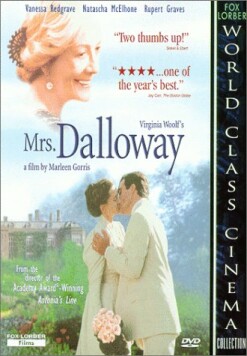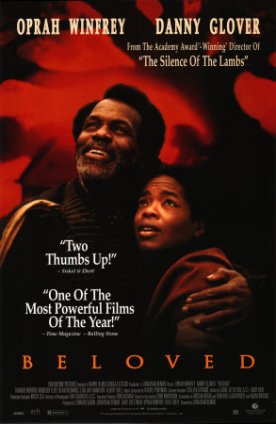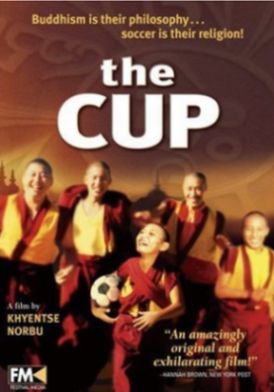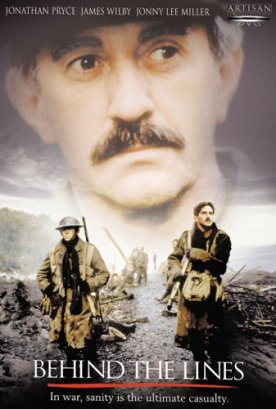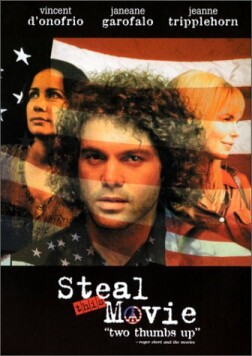Mrs. Dalloway
Mrs Dalloway is directed by Marleen Gorris, the Dutch director of the
unrelentingly feminist
Antonia’s Line,
from a screenplay by Eileen Atkins. The screenplay, so far as I can tell, is
very faithful to Virginia Woolf’s novel, so fans of Mrs Woolf may enjoy it. The
rest of us may take it as Ms Gorris no doubt intended, as a sort of adjunct of
the feminist theme she has concentrated on up until now in the form of the myth
of the sensitive plant ( “You know your
Shelley, Bertie” says Madeleine
Bassett; “Oh? Am
I?” says Bertie Wooster). The
sensitive plant is offended by the nastiness and injustice of the world, and, if
she is Mrs Clarissa Dalloway (Vanessa Redgrave), is determined in her very
English way to make the best of things by giving lovely parties. She talks to
herself in the opening scene about
“those ruffians, the
gods” who
“shouldn’t
have it all their own way.”
Not that she believes in the gods, let alone God, but she tells herself that
continuing to act the lady is a rebuke to all that the rough, nasty universe is
continually trying to prove to us about how sordid the world really is. She
lives in a world of damaged people—damaged by the lately ended First World
War mainly. On her first and only outing of the day she meets an acquaintance
who tells her about how his wife who has had to be put in a rest home for a time
because she “takes things
badly.” In counterpoint to the doings
of Clarissa and her family, we see moments in the life of a shell-shocked
veteran of the war, Septimus Warren-Smith (Rupert Graves) as he is periodically
terrified by memories of his days in the trenches.
. So these are intercut with Clarissa’s preparations for her party and her
meeting with an old suitor (Michael Kitchen), recently returned from India,
while her husband (John Standing), a member of Parliament, lunches with an
aristocratic lady (Margaret Tyzack) with a plan for reducing the population. At
first these two strands of narrative are not obviously connected, but Clarissa,
being a ruminative type, allows us several flashbacks into her youthful life
(starring Natascha McElhone as her younger self) to show us the ways in which
she is meant to be a kind of social shell-shock victim—a sensitive plant
who has been trodden on by men and society and family and middle-class morality
until, by the end, we are meant to understand why she and the veteran both come
to be suicidal.
Well, it doesn’t work for me. It
doesn’t work on two levels. On the
first level, the comparison between the mental derangement of post-traumatic
stress in the veteran’s life and
Clarissa’s common or garden variety of
regrets about a life lived amidst all that wealth and friendship can bestow
strikes me as being presumptuous in the extreme. On another, deeper level, it
doesn’t work even if we allow the
comparison. It doesn’t work in the
same way that Wilfred Owen’s war
poetry doesn’t work for me. Because it
is glorified (or not so glorified) self-pity. I admit the charms of self-pity
and have occasionally surrendered to its voluptuous pleasures myself. But I
don’t find it convincing material in art.
This is because it shuts the audience out rather than drawing it in. The
point would be lost if the sensitive plant were simply a representative of the
human condition, like everyman out there in the audience. Instead, like
Shelley’s original he is meant to seem a kind of secular holy man or woman,
whose sensitivities are more highly developed and whose sufferings are put on
display for the sole reason of impressing us with his spiritual superiority.
And, contrarian as I am, I find that the more that superiority is insisted on,
the less I believe in it. It should not be forgotten that Virginia Woolf, like
at least one of her heroes here, committed suicide. Like most suicides it
strikes me as the ultimate in this kind of bizarre one-upmanship that too many
people in our century have mistaken for artistic authenticity.
Discover more from James Bowman
Subscribe to get the latest posts to your email.

